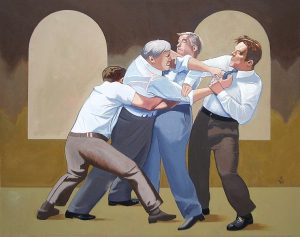
Okay, we’re living in a moment when politics are… a fraught subject. I listened the other night as my 25-year-old daughter and my husband–who are not actually on opposite sides of the fence–had a 45-minute conversation fight discussion exchange about something. My daughter has admirable patience when talking with people of opinions that do not march with hers. With her parents (whose politics are not far from hers at all), well the word “scolding” comes to mind. But we are her parents, so there’s that.
The fraughtness of politics within families sometimes has less to do with opinions than with family dynamics. This is one reason why I almost never talk politics (or religion) with my brother. He and I are so far apart on the political spectrum that it’s hard to believe we share any DNA at all. He is also the only remaining member of my nuclear family, and therefore the only person who gets the jokes and lore particular to growing up with our parents and in the time and place(s) we did. I think we both want to keep that connection, so we’re fairly careful not to get into the sort of standing-on-chairs-with-our-hands-around-each-other’s-necks conversation that our politics might cause–which would be complicated by who we are (I’m the elder, he was the baby; I’m the girl, he’s the boy; I was the responsible one (whether I wanted to be or not), he was the artist who was able to avoid a lot of the stuff he didn’t want to deal with).
This morning I remembered how angry my mother was about Richard Nixon. Well, weren’t we all angry about Richard Nixon? But… some time after I was graduated from college I spent six fairly awful months living with my mother in a tiny apartment in Los Angeles. This was about two years after Nixon had resigned in disgrace, and my mother, who could magic up grievances out of thin air, was angry because we had made her vote for Nixon.
Say what? Until that moment I had had no clue who she had voted for in the 1972 election–if I thought about it at all, I assumed she had voted for The Other Guy.
“You voted for Nixon?” (Hey, I was 23, and not beyond scolding a bit myself.)
What followed was a not-terribly-coherent explanation from my mother, to the effect that we forced her to vote for Nixon because we (my father and I, my brother having been too young to vote in the ’72 election) were vocally anti-Nixon. My mother was, um, vocally anti-my father, and I was siding with him and so she had to vote for Nixon and then Nixon had turned out to be even more crooked than any of us had realized. Somehow it was all our fault.
My mother was an alcoholic–I suspect she was self-medicating for an underlying anxiety/depression disorder with a spot of OCD–and this conversation took place during what was probably the lowest point in her later life. Most of her arguments didn’t make much sense. But underlying the politics and her illness were all those churning family dynamics. She said–she believed–that she had been coerced into voting for a candidate she didn’t much like. Richard Nixon was all my fault. Because of her anger at my father, and her belief that I was taking his side (my father’s, not George McGovern).
When I hear friends despairing about the gulfs between themselves and family members over politics, masks, vaccination and so on, I wonder about the role inter-familial resentments or prejudices play in the parties getting dug in until there is no way for either side to listen to the other.
I don’t know that there’s an answer. I try to think, when I find myself in a fraught discussion, of how subtext–resentments or anger or sadness–might be coloring my feelings and the other person’s. I try to. I’m still working on it, though.

When I was your daughter’s age, I used to argue politics with my father all the time despite the fact that my politics were very much shaped by the way I was raised and the fact that we didn’t differ greatly on much of anything. Part of that was generational and part of it was that our relationship was built on arguing over such things. It was only in the last years of his life that I refused to fight with him anymore. I’m sure he missed those fights, especially since after my mother died he had no one to fight with (they didn’t disagree about much, either), but I confess that I did not.
I have strong feelings about many political things, but I lost my taste for fighting about it a long time ago.
There are some people for whom argument is their favorite indoor sport. I am not one of them. That’s another thing to know about friends and family before you get into it with them–are they the sorts for whom fighting is meat and drink? If I try to practice my listening skills, stifle my “Yeah, buts” for a while, and let the other person have her say–sometimes they run out of gas because no one has opposed them yet. I become an the unpleasant person to argue with because I’m not engaging that way. But boy, howdy, throttling those “Yeah, buts” takes it right out of you.